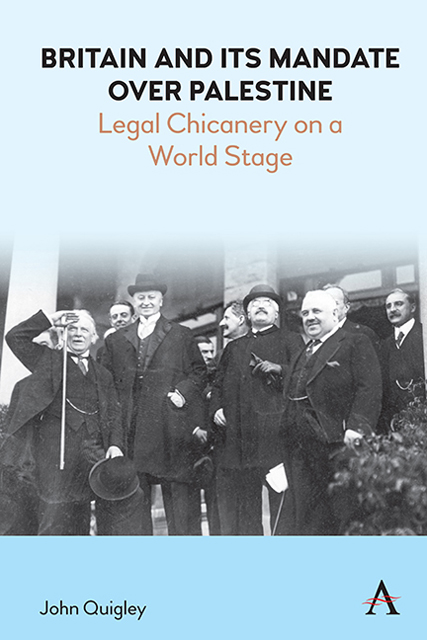Book contents
- Frontmatter
- Contents
- Preface
- Setting the Stage: Was Britain’s Rule in Palestine Legal?
- 1 The Balfour Declaration Is the Focal Point for the Legal Situation of Palestine
- 2 The Balfour Declaration Was a Binding Commitment to the Jewish People
- 3 The Jewish National Home Meant a Jewish State
- 4 The Balfour Declaration Was Issued to Affirm Jewish Rights in Palestine
- 5 The Paris Peace Conference Raised Jewish Statehood to the International Level
- 6 Britain’s Allies Made the Balfour Declaration an International Commitment
- 7 Britain’s Allies Endorsed Jewish Rights
- 8 Britain Took on Palestine Because of the League’s Mandate System
- 9 The League of Nations Protected Palestine’s Arab Population
- 10 Britain Was Given Palestine by the League of Nations
- 11 The League of Nations Put the Palestine Mandate into Legal Force
- 12 The Peace Treaty with Turkey Legalized Britain’s Status in Palestine
- 13 The Palestine Mandate Document Was a Treaty between Britain and the League
- 14 The League of Nations Required Britain to Implement the Balfour Declaration
- 15 The Palestine Mandate Document Implemented the League Covenant
- 16 The Palestine Mandate Document Recognized Jews as a National Group
- 17 The Palestine Mandate Document Bound Britain to the Balfour Declaration
- 18 The International Community Committed Itself to the Balfour Declaration
- 19 Britain Held Legal Status in Palestine
- 20 The United Nations Charter Carried Forward a Jewish Entitlement to Statehood
- Postscript: Why History Matters
- Documents Annex
- Notes
- Bibliography
- Index
2 - The Balfour Declaration Was a Binding Commitment to the Jewish People
Published online by Cambridge University Press: 10 January 2023
- Frontmatter
- Contents
- Preface
- Setting the Stage: Was Britain’s Rule in Palestine Legal?
- 1 The Balfour Declaration Is the Focal Point for the Legal Situation of Palestine
- 2 The Balfour Declaration Was a Binding Commitment to the Jewish People
- 3 The Jewish National Home Meant a Jewish State
- 4 The Balfour Declaration Was Issued to Affirm Jewish Rights in Palestine
- 5 The Paris Peace Conference Raised Jewish Statehood to the International Level
- 6 Britain’s Allies Made the Balfour Declaration an International Commitment
- 7 Britain’s Allies Endorsed Jewish Rights
- 8 Britain Took on Palestine Because of the League’s Mandate System
- 9 The League of Nations Protected Palestine’s Arab Population
- 10 Britain Was Given Palestine by the League of Nations
- 11 The League of Nations Put the Palestine Mandate into Legal Force
- 12 The Peace Treaty with Turkey Legalized Britain’s Status in Palestine
- 13 The Palestine Mandate Document Was a Treaty between Britain and the League
- 14 The League of Nations Required Britain to Implement the Balfour Declaration
- 15 The Palestine Mandate Document Implemented the League Covenant
- 16 The Palestine Mandate Document Recognized Jews as a National Group
- 17 The Palestine Mandate Document Bound Britain to the Balfour Declaration
- 18 The International Community Committed Itself to the Balfour Declaration
- 19 Britain Held Legal Status in Palestine
- 20 The United Nations Charter Carried Forward a Jewish Entitlement to Statehood
- Postscript: Why History Matters
- Documents Annex
- Notes
- Bibliography
- Index
Summary
The reference to the Balfour Declaration in the 1948 statement proclaiming Israeli statehood was premised on the Balfour Declaration as a document carrying normative force. As we saw, the 1948 statement began from the 1897 assertion of Jewish rights and then said that that assertion of rights was recognized in the Balfour Declaration. As for the British Government, its view of the Balfour Declaration was less clear. It would seek, as we shall see, to gain acceptance of the national home concept by others but without claiming legal force for the Balfour Declaration itself. Moreover, as we shall see in Chapter 17, the British Government appeared to regard the Balfour Declaration as a policy statement, a policy that could be reversed if circumstances warranted.
Nonetheless, the supposedly binding nature of the Balfour Declaration became an element of the Narrative. Britain was said to have committed itself to a national home for the Jewish people in Palestine. Yoram Dinstein provided a legal underpinning. The Balfour Declaration, Dinstein wrote, “had a binding force as far as that country was concerned.” Dinstein said that this was so because later British governments said so. “The British intention to be bound by the text (formally acknowledged and reiterated by successive British governments) can easily be ascertained.” The commitment was based, Dinstein wrote, on the international law principle that a state can be bound by a promise it makes, so long as it intended to bind itself. “Under international law (as elucidated in two subsequent decisions of the International Court of Justice, in the Eastern Greenland case and in the Nuclear Tests cases),” he continued, “a unilateral declaration issued by the competent authorities of a state can have a binding effect upon that state, if such was the intention behind it.”1 The Balfour Declaration hence was said to be binding not as a two-party legal act, but as a unilateral commitment.
Dinstein's argument to that point was sound. A state can indeed be bound by a commitment made unilaterally. The Balfour Declaration did include the statement that Britain intended to apply its “best endeavours” to “facilitate” a national home” for the “Jewish people” in Palestine, hence Dinstein could find a way to see it as a unilaterally made commitment.
- Type
- Chapter
- Information
- Britain and its Mandate over PalestineLegal Chicanery on a World Stage, pp. 13 - 16Publisher: Anthem PressPrint publication year: 2022

